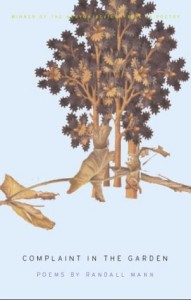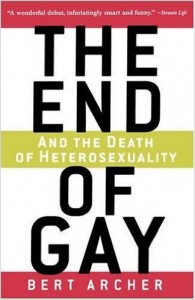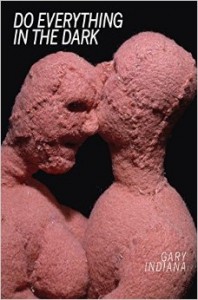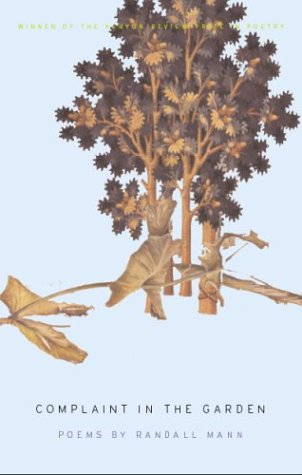 Complaint in the Garden
Complaint in the Garden
by Randall Mann
Zoo Press. 55 pages, $14.95
Randall Mann’s debut collection of poems, which won the 2003 Kenyon Review Prize in Poetry, distinguishes him as a poet of considerable and varied gifts. What’s notable about Mann’s verse, in addition to the overall elegance and economy of his lines, is his ability to navigate the strictures of poetic form. In poems such as “Fiduciary,” “Evidence,” and “Poem Beginning with a Line by John Ashbery,” he demonstrates a technical skill that honors poetic traditions and allows a unique voice to emerge. The collection is anchored by a series of “complaints.” The lament at the heart of each poem is less about lost love than about the speaker’s fundamental disconnection from the world. It’s a theme that Mann addresses again in “The Landscape of Deception”: “everything here is false, beauty not truth:/ the falling, falling/ petals of a Japanese tulip/ already turning ugly.” The title poem of the collection, “Complaint in the Garden,” takes as its subject matter the 17th-century shipwreck of William Strachey and Sir George Somers at Bermuda. Like the title work, many of the poems are inspired by the history and landscape of Florida and its surrounding regions. Though born in Utah, Mann seems continually drawn to and haunted by the Palmetto state, and poems such as “Henry James in Jacksonville” and “Complaint, Poolside” seem to exemplify his troubled relationship with it. There’s a subtle homoeroticism at work in some of the complaints, but Mann addresses this theme more directly in other poems. In “Eros” and “Old Haunts,” for example, he explores the varieties of gay sexuality and camaraderie. In “Late Epithalimion” (a poem which first appeared in this journal), he writes in celebration of his marriage to his partner, ending the poem with the lines, “Outside, the rain like luck/ licked our filthy windows clean.” Mann exhibits in this collection a great versatility of both form and subject matter.
By Jim Nawrocki
 The End of Gay and the Death of Heterosexuality
The End of Gay and the Death of Heterosexuality
by Bert Archer
Thunder’s Mouth Press. 288 pages, $14.95
First published in Canada two years ago but only now out in the U.S., The End of Gay raises questions that many of his readers have probably pondered but few have openly discussed. Focusing primarily on the last twenty years of sexual history (but covering topics as diverse as psychoanalysis, the Kinsey Report, and the bonobo chimps), The End of Gay provides a critical overview of identity-centered gay and lesbian (and queer) scholarship and culture. The book is well researched, though the absence of Eve Sedgwick’s work—arguably some of the central texts in the field—is puzzling. Archer successfully integrates anecdotal and autobiographical elements into the text, offering the introspections of a sexually active man and his reflections about the current state of sexual affairs. His conclusion? The categories we have just don’t work any more: “We are enriched, straight and gay (and bi and transgendered and two-spirited), for having gone through gay, and we’ll be much better off when we’re out the other side.” Identity politics, emerging largely from the women’s movement, is a complicated issue for us all. Think of how we gradually went from G to glbtq. Our identities proliferate under the tent of inclusiveness and diversity, but, suggests Archer, these identities also handcuff us, compelling us to limit our desires to parameters set by our identities. Giving due credit to our gay and lesbian antecedents, whom he calls warriors, Archer concludes: “The most fundamental, most valuable victory won by our warrior class has been the space—political, personal, economic—to do as we please, an inherent and necessary part of which is the ability to step back from the front lines and see ourselves as we actually are in peacetime, as sexual beings whose boundaries are inscribed not by gender or anatomy, and certainly not by anything as contrived as sexual identity, but by pleasure and emotional opportunity.”
By Chris Freeman
 Do Everything in the Dark
Do Everything in the Dark
Gary Indiana
St. Martin’s Press / Griffin. 256 pages $12.95
Gary Indiana is the critical coroner of America’s walking dead, a vast throng. His book on Andrew Cunanan, Three Month Fever, is pure genius. It is my opinion that he wrote one of the best short story collections in my lifetime, Scar Tissue, which includes his mad-brilliant story, “I Am Candy Jones.” In his sixth novel, Do Everything in the Dark (just published in paperback), Indiana examines the tragicomic fate of la vie bohème when all the bright butterflies, full of their dreams and delusions in the big city, slam into the aging game. It continues Indiana’s exploration of social anomie and disconnection with his famous scabrous wit. But it is also a chilling chronicle of madness and failure, disastrous life choices and the many ways love dies in a world that a lot of people find increasingly impossible to live in. It’s the story of several couples and solitary wanderers through the summer of 2001, as their internationally scattered vacations throw their long-festering incompatibilities and resentments into exotic and unbearable relief. Indiana’s large and terrifying cast of America’s cultural elite exhibit their worst behavior—although the author does show some sympathy for their fears and fragilities and thwarted good intentions. This is a dark, funny, and mature novel from a seasoned witness to Americans’ foibles of the past thirty years.
By John Mitzel






